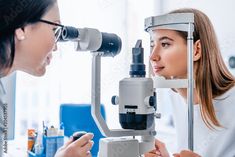Do you have trouble reading the small print? Do you find yourself squinting or holding books and newspapers far away from your face? If so, you may be in need of vision correction. In this blog post, we will discuss all of the different types of vision correction procedures available. We will also talk about the benefits and drawbacks of each procedure so that you can make an informed decision about which one is right for you.
Contents
Understanding Vision Correction

There are several methods that can be used to improve blurred vision caused by a refractive error. A refractive error occurs when the eye doesn’t bend light correctly as it enters, resulting in a blurry image. Some people require vision correction to fix this issue.
Refractive error is when the eye isn’t able to focus the image correctly on the retina, which is the part of the eye that processes the image and sends it to the brain. This can happen for a number of reasons, but usually, it’s because the eye is either too long or too short.
In this guide, we’ll go over everything you need to know about vision correction, from the different types of procedures available to what you can expect during and after treatment.
The first step in understanding vision correction is to understand what exactly your options are.
What Are The Different Types Of Vision Correction?

The main types of vision correction are:
Eyeglasses
They are the most common type of vision correction. They correct your vision by bending the light that enters your eyes. This helps the light to focus on the back of your eye, where it can be properly processed.
Contact lenses
Contact lenses are another popular type of vision correction. They work in a similar way to eyeglasses, but they sit directly on your eye. This means that they can correct a wider range of vision problems.
Refractive surgery
It is a type of surgery that changes the shape of your eye. This helps to correct vision problems such as nearsightedness, farsightedness, and astigmatism.
Low vision devices
They are special devices that can help you to see better if you have a severe vision impairment. These devices include magnifiers, special glasses, and talking books.
Refractive lens exchange
This type of vision correction replaces your natural lens with an artificial intraocular lens. The most common type of refractive lens exchange is cataract surgery.
Photorefractive keratectomy
PRK, or photorefractive keratectomy, is a type of vision correction surgery that changes the shape of your cornea. PRK is sometimes called surface ablation because, unlike LASIK, no flap is created in the cornea during the surgery.
During PRK, your surgeon will use a laser to carefully remove a small amount of tissue from the surface of your eye. This will change the shape of your cornea so that light can be properly focused on your retina, resulting in clearer vision.
It is often used to treat mild to moderate nearsightedness, farsightedness, and astigmatism.
Lasik
If you’re considering Lasik surgery to improve your vision, it’s important to understand the procedure and what it can and cannot do for you. Lasik is a type of refractive surgery that uses a laser to reshape the cornea, the clear outer surface of the eye. This can improve vision in people who are nearsighted, farsighted or have astigmatism.
While Lasik is generally safe and effective, it’s not right for everyone. Be sure to talk to your eye doctor about whether Lasik is a good option for you.
Lasek
Lasek is a vision correction procedure that uses a laser to correct your vision. It is similar to Lasik, but it does not require the use of a flap. Instead, a thin layer of tissue is removed from the surface of your eye. This allows the laser to directly access your cornea, which is the part of your eye that is responsible for your vision.
Lasek is a safe and effective way to improve your vision. It has been performed for over 20 years and has a very high success rate. The procedure is relatively quick, taking only about 15 minutes. Recovery from LASEK is also quick, with most people being able to see well enough to drive within a day or two.
If you are considering LASEK, it is important to talk to your doctor about whether it is the right procedure for you. There are a number of factors that can affect your suitability for LASEK, including the severity of your vision problem, and the thickness of your cornea.
What Are The Benefits Of Vision Correction?
The benefits of vision correction are as follows:
Better vision
This is the most obvious benefit of vision correction. If you have poor vision, you will likely experience an improvement in your vision after undergoing a vision correction procedure.
Improved self-esteem
Another great benefit of vision correction is that it can improve your self-esteem. Many people who have poor vision feel self-conscious about their appearance and feel as though they are not as attractive as those with better vision. After undergoing a vision correction procedure, many people report feeling more confident about their appearance.
Improved safety
Poor vision can also lead to increased risks of accidents and injuries. By correcting your vision, you will be able to see more clearly and avoid potential hazards.
Painless Procedure
LASIK surgery is a painless procedure that takes only minutes to complete. You will be given numbing eye drops to prevent any discomfort.
LASIK is an outpatient procedure, which means you can go home the same day. Most people report seeing results the next day.
Customized Treatment
LASIK treatment is customized for each individual patient. This is done by mapping the eye with a high-resolution instrument and selecting the appropriate laser setting for your prescription.
Improved Eye Health
In addition to 20/20 vision, LASIK can also improve the overall health of your eyes. This is because the cornea is responsible for two-thirds of the eye’s focusing power. When it is misshapen, it results in a refractive error.
No Inconvenience
Vision correction surgery is an outpatient procedure, which means no hospital stay. You can go home the same day.
Fewer Risks
Unlike other types of surgery, vision correction has relatively few risks and complications.
More Precise
Thanks to advances in technology, your surgeon can target your exact problem with greater precision than ever before.
If you are considering vision correction, it is important to consult with an experienced eye doctor to learn more about the benefits and risks of the various procedures. With the help of a qualified professional, you can be sure that you are making the best decision for your needs.
Risk
There is various risk:
Corneal abrasion: It happens when the surgeon accidentally cuts or scratches the cornea.
Infection: It usually happens when bacteria enter the eye through an incision.
Bleeding: It is usually not serious and will go away on its own.
Allergic reaction: It happens when the body has an allergic reaction to the medication used during the surgery.
Dry eye: It happens when the eye does not make enough tears.
Glare: It happens when the light hits the eye in an unpleasant way.
Double vision: It happens when the eye muscles are not working together correctly.
Eye pain: It happens when the eye is sore or irritated.
Headache: It happens when the eye is in pain or irritated.
Intraocular pressure: It happens when the pressure in the eye is too high.
Retinal detachment: It happens when the retina becomes detached from the back of the eye.
These are common complications that can occur during or after the surgery.
Conclusion
It may be concluded vision correction is a viable and effective means to improve an individual’s quality of life. It is essential to consult with an eye doctor in order to determine which type of vision correction procedure, if any, is best suited for each person.
For more information and guidance, please contact Eye Mantra. This platform offers the most accurate guidance and advanced surgical options for your eyes including PRK, Femto Lasik, SMILE surgery, Standard LASIK, and Contoura vision. If you have any questions on LASIK surgery, LASIK surgery cost, and LASIK procedure, call us at +91-9711116605 or email at [email protected].
EyeMantra foundation provides effective free Squint surgery, Lasik surgery, Glaucoma surgery, and Retina surgery as well.


